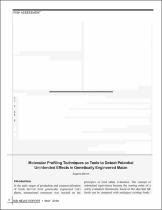 ResearchSpace
ResearchSpace
Molecular profiling techniques as tools to detect potential unintended effects in genetically engineered maize
JavaScript is disabled for your browser. Some features of this site may not work without it.
- ResearchSpace
- →
- Research Publications/Outputs
- →
- Journal Articles
- →
- View Item
| dc.contributor.author |
Barros, E

|
|
| dc.date.accessioned | 2010-10-11T09:47:41Z | |
| dc.date.available | 2010-10-11T09:47:41Z | |
| dc.date.issued | 2010-05 | |
| dc.identifier.citation | Barros, E. 2010. Molecular profiling techniques as tools to detect potential unintended effects in genetically engineered maize. Information systems for Biotechnology news report, pp 4-7 | en |
| dc.identifier.uri | www.isb.vt.edu | |
| dc.identifier.uri | http://hdl.handle.net/10204/4465 | |
| dc.description | Copyright: 2010 Information Systems for Biotechnology-Virginia Tech | en |
| dc.description.abstract | In the early stages of production and commercialization of foods derived from genetically engineered (GE) plants, international consensus was reached on the principles of food safety evaluation. The concept of substantial equivalence became the starting point of a safety evaluation framework, based on the idea that GE foods can be compared with analogous existing foods. However, the controversy regarding GE plants and their potential impact on human health and the environment has necessitated the development of additional methods of risk assessment. Risk assessment focuses on adverse unintended effects that could potentially result from random transgene integration. Unintended effects can also occur in conventional breeding from mutagenesis or hybridization and backcrossing. Other factors totally unrelated to genetic engineering can contribute to alterations, including plant genetic characteristics (cultivar, isogenic lines), agronomic factors (soil, fertilizers), and environmental influences (location, weather, stress). These factors need to be considered during “GE versus non-GE” evaluations. The best way to detect unintended effects is through non-targeted analysis by using profiling technologies. | en |
| dc.language.iso | en | en |
| dc.publisher | Information Systems for Biotechnology-Virginia Tech | en |
| dc.relation.ispartofseries | ISB News Report | en |
| dc.subject | Genetically engineered plants | en |
| dc.subject | Genetic engineering | en |
| dc.subject | Food safety | en |
| dc.subject | Genetically engineered maize | en |
| dc.subject | Maize | en |
| dc.subject | Molecular profiling | en |
| dc.title | Molecular profiling techniques as tools to detect potential unintended effects in genetically engineered maize | en |
| dc.type | Article | en |
| dc.identifier.apacitation | Barros, E. (2010). Molecular profiling techniques as tools to detect potential unintended effects in genetically engineered maize. http://hdl.handle.net/10204/4465 | en_ZA |
| dc.identifier.chicagocitation | Barros, E "Molecular profiling techniques as tools to detect potential unintended effects in genetically engineered maize." (2010) http://hdl.handle.net/10204/4465 | en_ZA |
| dc.identifier.vancouvercitation | Barros E. Molecular profiling techniques as tools to detect potential unintended effects in genetically engineered maize. 2010; http://hdl.handle.net/10204/4465. | en_ZA |
| dc.identifier.ris | TY - Article AU - Barros, E AB - In the early stages of production and commercialization of foods derived from genetically engineered (GE) plants, international consensus was reached on the principles of food safety evaluation. The concept of substantial equivalence became the starting point of a safety evaluation framework, based on the idea that GE foods can be compared with analogous existing foods. However, the controversy regarding GE plants and their potential impact on human health and the environment has necessitated the development of additional methods of risk assessment. Risk assessment focuses on adverse unintended effects that could potentially result from random transgene integration. Unintended effects can also occur in conventional breeding from mutagenesis or hybridization and backcrossing. Other factors totally unrelated to genetic engineering can contribute to alterations, including plant genetic characteristics (cultivar, isogenic lines), agronomic factors (soil, fertilizers), and environmental influences (location, weather, stress). These factors need to be considered during “GE versus non-GE” evaluations. The best way to detect unintended effects is through non-targeted analysis by using profiling technologies. DA - 2010-05 DB - ResearchSpace DP - CSIR KW - Genetically engineered plants KW - Genetic engineering KW - Food safety KW - Genetically engineered maize KW - Maize KW - Molecular profiling LK - https://researchspace.csir.co.za PY - 2010 T1 - Molecular profiling techniques as tools to detect potential unintended effects in genetically engineered maize TI - Molecular profiling techniques as tools to detect potential unintended effects in genetically engineered maize UR - http://hdl.handle.net/10204/4465 ER - | en_ZA |





